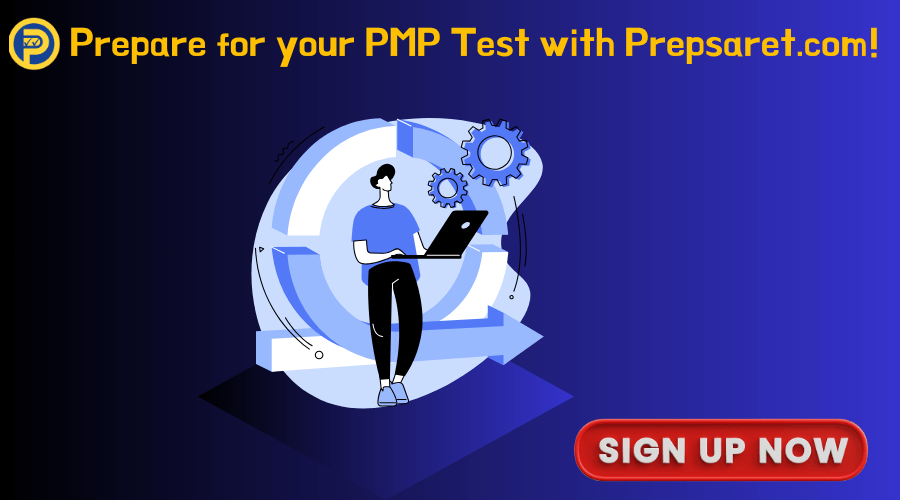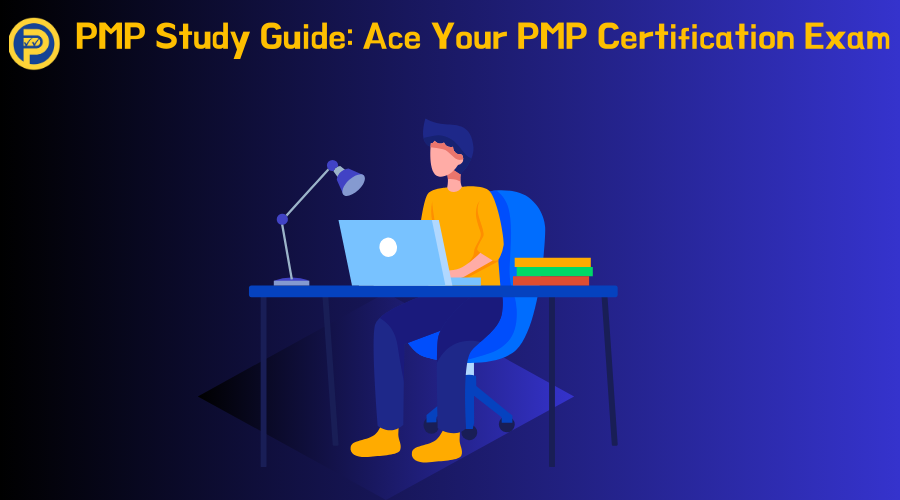If you’re looking to take your career in project management to the next level, then you’ve likely heard of the PMP (Project Management Professional) certification.
It’s one of the most respected credentials in the industry, but preparing for the exam can be overwhelming without the right resources.
That’s where a solid PMP study guide comes in handy. We at Prepsaret are here to help you journey through your PMP certification process.
In this post, of course, we’ll break down everything you need to know about the PMP exam, why you need a study guide, and give examples of how you can ace the exam with the right preparation. Let’s dive in!
What is the PMP Certification?
The PMP certification is a globally recognized credential that demonstrates your expertise and competence in project management. It’s issued by the Project Management Institute (PMI) and is highly valued by employers across industries.
Achieving this certification proves you have the skills to lead and direct projects, which can significantly boost your career prospects, earning potential, and job opportunities.
Having the PMP certification for project side can open doors to leadership roles and make you more competitive in a crowded job market. So, if you want to become a top-tier project manager, earning the PMP certification is a must!
PMP Certification Requirements
Before you start planning and studying, it’s important to know the requirements for the PMP exam:
- Education: You need a secondary degree (high school diploma, associate’s degree, or the global equivalent) or a four-year degree (bachelor’s or equivalent).
- Experience: You must have project management experience. If you have a secondary degree, you’ll need at least 5 years of project management experience, including 7,500 hours leading and directing projects. If you have a four-year degree, you need at least 3 years of project management experience, including 4,500 hours leading and directing projects.
- Project Management Education: You also need 35 hours of project management education, which can be gained through online courses or workshops.
Why Do You Need a Study Guide?
When preparing for the exam, a structured study guide can be a game changer. Here’s why:
- Clarity: A good study guide breaks down complex concepts into manageable chunks, making it easier for you to understand and retain information.
- Focus: With so much material to cover, a study guide helps you prioritize key topics, ensuring you focus on what’s most important for the exam.
- Efficiency: A structured study guide helps you study in a logical sequence, saving you time and reducing confusion.
Understanding the PMP Exam
Before you get started with your study guide, it’s important to understand the structure and content of the exam. Here’s a quick breakdown:
PMP Exam Structure
The exam consists of 180 questions, which include a combination of multiple-choice, drag-and-drop, and hot-spot questions. The actual exam itself covers three key areas from the exam Content Outline:
- People: Leadership and team management
- Process: Project management processes and best practices
- Business Environment: How projects align with the organization’s strategy.
PMP Eligibility Requirements
To be eligible for the PMP exam, you must meet the educational and experience prerequisites mentioned earlier. Once we decide you’re eligible, you’ll need to submit an application to PMI, which will be reviewed before you can schedule a date for your exam.
PMP Exam Cost and Scheduling
The exam costs $405 for PMI members and $555 for non non-members. You can schedule your exam through the website or PMI’s online test portal page, and choose to take it at a Pearson VUE test center or online.
What Should a PMP Study Guide Have?
A good PMP study guide should include the following:
- Comprehensive Content: It should cover all the major topics in the PMP exam content outline.
- Practice Questions: These will help you familiarize yourself with the exam format and assess your knowledge.
- Exam Tips: Helpful strategies for approaching the exam, including time management and how to answer tricky questions.
How Is the PMP Study Guide Different From PMBOK?
While the PMBOK (Project Management Body of Knowledge) is the official guide to project management and a key resource for exam preparation, it’s often more theoretical.
A PMP study guide, on the other hand, is designed to help you prepare specifically for the exam. It’s more focused on practical tips, prep questions, and actual exam questions with more specific strategies, making it a great companion to the PMBOK.
What Are the Different PMP Study Guides Available?
There are several study guides to choose from, each catering to different learning preferences. Some popular options include:
- Books: Comprehensive guides like “The PMP Exam: How to Pass on Your First Try” by Andy Crowe.
- Online Courses: Platforms like Prepsaret, Coursera, and Udemy offer interactive lessons.
- Practice Exams: Many study guides include prep tests to help you test your knowledge under exam conditions.
Why Use Prepsaret as Part of Your PMP Study Guide?
If you’re looking for a high-quality study guide, look no further than Prepsaret. Here, you’ll find a study guide crafted by PMP-certified experts, designed to help you pass your exam on the first try.
With clear and concise explanations, Prepsaret simplifies complex concepts, making your study process easier and more enjoyable.
Prepsaret offers flexible study materials, available in digital, paperback, or comprehensive bundles, so you can choose the format that works best for you.
With mock exams, reviews, flashcards, video tutorials, and even access to expert-led webinars, Prepsaret is your one-stop shop for exam success.

Key Components of an Effective PMP Study Guide
An effective PMP study and data review guide should have:
PMP Exam Syllabus Breakdown
The syllabus is divided into three major domains: People, Process, and Business Environment. Each domain has specific tasks and objectives, and knowing the weightage of knowledge in each domain is crucial for planning a complete and focused study.
Study Timelines and Goals
Setting realistic goals is key. Depending on your starting point (beginner, intermediate, or advanced), you’ll need different amounts of study time. Aim for 150-200 hours of study, broken into manageable chunks.
Learning Methods and Resources
There’s a wide range of helpful resources, both online and offline, to help with your studies. Official resources like the PMBOK Guide and helpful third-party books are essential, of course, but don’t forget to incorporate helpful prep tests and video lessons.
Best Resources for PMP Exam Preparation
The best way to prepare for the PMP exam is to combine several resources. Here’s what you’ll need:
Official Resources
- PMI’s PMP Exam Content Outline: This document outlines the key topics you’ll need to study.
- PMBOK Guide: The official guide from PMI is a must-have reference.
Online Courses and Platforms
Popular platforms like Prepsaret, Coursera, Udemy, and LinkedIn Learning offer excellent PMP prep courses. Look for courses that cover all three domains and provide both examples and hands-on project examples for preparation.
Practice Tests and Simulations
Mock exams are one of the best ways to gauge your readiness. Sites like Prepsaret offer a range of prep questions, complete with questions, answers, and simulations that mimic real-world examples.
PMP Study Strategies That Work
Now that you’ve got your resources, here’s how to make the most of them:
Focus on High-Yield Topics
Focus on topics that carry the most weight on the exam. These include integration management, cost management, and stakeholder management.
Time Management Techniques
Use methods like the Pomodoro technique to study in short bursts. During the exam, keep track of time, and don’t spend too long on the answer to one question.
Tackling Difficult Questions
For tough questions, eliminate wrong answers first, and then make your best guess from the remaining options. For situational questions, focus on the project context and apply your project management and security knowledge.
Check this out: Try PMP Free Questions
PMP Study Common Challenges and How to Overcome Them
Dealing with Information Overload
It’s easy to get overwhelmed by the sheer amount of information in life. Break it down into smaller chunks and focus on mastering one topic at a time.
Staying Motivated
Stay disciplined by setting study goals and tracking your progress. Celebrate small wins along the way to keep your motivation up.
Managing Exam Anxiety
Practice relaxation techniques like deep breathing to calm your brain and nerves before and during the exam.
PMP Study Guide FAQs
What Is the Passing Score for the PMP Exam?
The passing score for the exam is not officially disclosed by PMI and varies based on the difficulty of the questions. Common belief suggests a target score of around 61%, but it can range from 60% to 75% depending on the exam version.
Each candidate receives a unique set of questions, and the scoring reflects performance across different domains rather than a fixed percentage of correct answers.
Can I Pass the PMP Exam on the First Attempt?
Yes, you can pass the exam on your first attempt by following a structured study plan, thoroughly understanding the PMBOK Guide, and practicing with sample questions.
Focus on mastering situational questions and applying project management principles rather than rote memorization. Time management during the exam is crucial; aim to answer 180 questions in 3 hours and 50 minutes.
Consistent study and a clear understanding of concepts will enhance your chances of success and prove useful when managing projects.
Is 2 Months Enough to Study for PMP?
Yes, two months can be sufficient to study for the exam, especially if you dedicate 3-4 hours daily to focused study.
Most experts recommend a preparation period of 2-3 months for PMP study, allowing time for prep tests and review of key course concepts. However, individual study habits and prior knowledge may influence how effectively one can prepare within this timeframe.
How to Self-Study for PMP?
To effectively self-study for the exam, start by creating a study plan that outlines a schedule covering all PMBOK knowledge areas.
Utilize quality resources, such as PMP prep books, online training courses, and prep tests.
Regularly practice by taking mock exams to simulate test conditions and identify any weak areas.
Engage actively by joining study groups or forums for discussion and support. Finally, regularly assess and review your progress and adjust your study strategy as needed.
Is 70% Enough to Pass PMP?
The PMP passing score is not fixed and varies based on the difficulty of the questions each candidate receives. While many sources suggest aiming for over 70% in prep tests, achieving this percentage does not guarantee passing.
The Project Management Institute website (PMI) does not publicly disclose data on the exact passing score, but candidates often report needing to answer around 70-80% of questions correctly to increase their chances of success.
Is PMP Very Hard?
The exam is considered challenging, with a pass rate estimated between 60-70%. Key difficulties include a broad syllabus, application-based questions, and the need for effective time management during the 230-minute exam.
Candidates face various question types, including situational scenarios that require critical thinking. Preparation typically demands several months of dedicated study and practical experience in project management.
PMP Study Guide Final Thoughts
The journey to passing the exam can seem daunting, but with the right approach, it’s achievable. Here’s a quick recap of key tips to help you succeed:
- Choose the Right Study Guide: Make sure it’s comprehensive, structured, and tailored to the exam.
- Stay Consistent: Set aside dedicated study time and stick to your plan.
- Practice, Practice, Practice: Use mock exams and prep questions to test your knowledge and get comfortable with the exam format.
- Don’t Rush: Take your time to understand the material thoroughly.
Now that you have all the tools and tips, it’s time to take the next step toward your PMP certification. Invest in the right study guide, stay motivated, and give yourself the best shot at passing on your first attempt.
The exam may be challenging, but with determination and the right resources, success is within reach. Good luck—you’ve got this!

